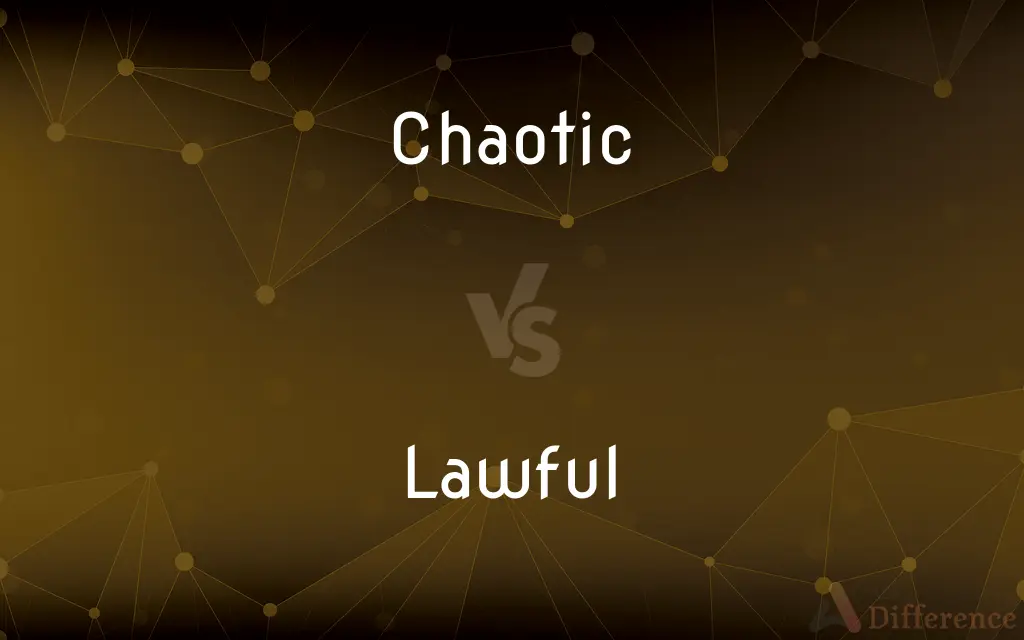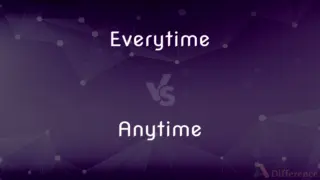Chaotic vs. Lawful — What's the Difference?
By Tayyaba Rehman & Fiza Rafique — Updated on April 19, 2024
Chaotic characters act based on personal freedom and spontaneity, while lawful ones adhere to society's rules and order.

Difference Between Chaotic and Lawful
Table of Contents
ADVERTISEMENT
Key Differences
Chaotic individuals prioritize personal freedom and often reject strict rules, valuing flexibility and adaptability in their actions. Whereas lawful individuals believe in following rules and regulations, seeing them as essential for maintaining order and predictability in society.
In a chaotic approach, decisions are made based on the situation and personal judgment rather than pre-established guidelines. On the other hand, lawful behavior is characterized by a strict adherence to laws and a structured way of decision-making, often irrespective of personal feelings.
Chaotic behavior can sometimes lead to unpredictability and a disregard for consequences, as actions are based more on personal desires than on societal expectations. Lawful individuals, however, often weigh their actions against legal or moral standards, aiming for consistency and reliability.
While chaotic alignments are often associated with creativity and innovation due to their flexible nature, they can also result in inconsistency and a lack of direction. In contrast, lawful alignments promote stability and consistency but can be seen as inflexible and resistant to change.
The chaotic viewpoint sees rules as limitations to personal freedom and self-expression. Conversely, the lawful perspective views rules as safeguards that ensure fairness and help prevent chaos in society.
ADVERTISEMENT
Comparison Chart
Basis of Actions
Personal freedom and spontaneity
Adherence to rules and regulations
Decision Making
Situational, personal judgment
Guided by laws and structured codes
View on Rules
Sees rules as limitations
Views rules as necessary for order
Resulting Behavior
Unpredictable, flexible
Consistent, predictable
Societal Perception
Often viewed as rebellious
Seen as reliable and trustworthy
Compare with Definitions
Chaotic
Emphasizing individual choice in decision-making.
His chaotic nature led him to make decisions on the fly.
Lawful
Often associated with reliability and trustworthiness.
Their lawful reputation made them a preferred partner in business.
Chaotic
Favoring personal freedom over societal rules.
A chaotic character might choose to ignore traffic laws to save time.
Lawful
Valuing order and predictability in actions.
Her lawful approach to management ensured all processes were standardized.
Chaotic
Acting spontaneously and unpredictably.
His chaotic approach to life meant no two days were ever the same.
Lawful
Believing in the importance of structure in society.
As a lawful judge, she upheld the court's procedures meticulously.
Chaotic
Rejecting structured systems and regulations.
She viewed the company's strict policies as chaotic constraints.
Lawful
Strictly adhering to established laws and guidelines.
He was a lawful citizen, always paying his taxes on time.
Chaotic
Often associated with creativity and innovation.
The artist's chaotic methods produced unique and unexpected results.
Lawful
Making decisions based on legal or moral codes.
His lawful demeanor meant following the rules, even when inconvenient.
Chaotic
Chaotic was originally a Danish trading card game. It expanded to an online game in America which then became a television program based on the game.
Lawful
Being within the law; allowed by law
Lawful methods of dissent.
Chaotic
A condition or place of great disorder or confusion.
Lawful
Established, sanctioned, or recognized by the law
The lawful heir.
Chaotic
A disorderly mass; a jumble
The desk was a chaos of papers and unopened letters.
Lawful
Obeying the law; law-abiding.
Chaotic
Often Chaos The disordered state of unformed matter and infinite space supposed in some cosmogonic views to have existed before the ordered universe.
Lawful
(legal) Conforming to, or recognised by the laws of society.
Lawful money is always a land asset and can only be issued by an actual land jurisdiction government — not a corporation.
Chaotic
Chaos theory.
Lawful
Operating according to some law or fundamental principle.
Chaotic
(Mathematics) A dynamical system that has a sensitive dependence on its initial conditions.
Lawful
(role-playing games) A character having a lawful alignment.
Chaotic
(Obsolete) An abyss; a chasm.
Lawful
Conformable to law; allowed by law; legitimate; competent.
Chaotic
Filled with chaos.
Lawful
Constituted or authorized by law; rightful; as, the lawful owner of lands.
Chaotic
Extremely disorganized or in disarray.
Lawful
Conformable to or allowed by law;
Lawful methods of dissent
Chaotic
(mathematics) Highly sensitive to starting conditions, so that a small change to them may yield a very different outcome.
Lawful
According to custom or rule or natural law
Chaotic
(role-playing games) Aligned against following or upholding laws and principles.
Lawful
Having a legally established claim;
The legitimate heir
The true and lawful king
Chaotic
(role-playing games) A character having a chaotic alignment.
Chaotic
Resembling chaos; confused.
Chaotic
Lacking a visible order or organization
Chaotic
Completely unordered and unpredictable and confusing
Chaotic
Of or relating to a sensitive dependence on initial conditions
Common Curiosities
How do lawful individuals handle change?
Lawful individuals may struggle with change, preferring stability and existing structures.
What are typical traits of a lawful individual?
Lawful individuals are characterized by a strong adherence to rules, consistency in behavior, and valuing societal order.
Can a chaotic person be predictable?
Chaotic people are generally unpredictable due to their situational and personal decision-making processes.
Is being lawful always good?
While being lawful is generally seen as positive, it can also lead to inflexibility and resistance to necessary changes.
What defines a chaotic character?
A chaotic character is defined by spontaneity, a disregard for rules, and prioritizing personal freedom.
Can organizations be chaotic or lawful?
Yes, organizations can embody chaotic or lawful characteristics, influencing their culture and operations.
How do lawful principles affect personal freedom?
Lawful principles can limit personal freedom by imposing strict rules and expectations on behavior.
Is being chaotic inherently bad?
Being chaotic is not inherently bad; it often fosters creativity and adaptability, though it can lead to instability.
Do lawful environments enhance safety?
Lawful environments typically enhance safety by creating predictable and controlled settings.
How do children benefit from a lawful upbringing?
A lawful upbringing can provide children with a sense of security and structure, aiding in their development.
What is the impact of a chaotic lifestyle on personal relationships?
A chaotic lifestyle can either enrich relationships through spontaneity or strain them due to lack of reliability.
How do chaotic and lawful approaches influence leadership?
Chaotic leaders may be seen as innovative and adaptable, whereas lawful leaders are viewed as reliable and structured.
Can a chaotic approach be beneficial in business?
In some sectors, a chaotic approach can drive innovation and rapid adaptation to market changes.
Are chaotic individuals more creative?
Chaotic individuals often display higher levels of creativity due to their flexibility and rejection of conventional norms.
What legal systems favor lawful characteristics?
Most modern legal systems favor lawful characteristics, promoting order and fairness in society.
Share Your Discovery

Previous Comparison
Everytime vs. Anytime
Next Comparison
Mockingbird vs. CatbirdAuthor Spotlight
Written by
Tayyaba RehmanTayyaba Rehman is a distinguished writer, currently serving as a primary contributor to askdifference.com. As a researcher in semantics and etymology, Tayyaba's passion for the complexity of languages and their distinctions has found a perfect home on the platform. Tayyaba delves into the intricacies of language, distinguishing between commonly confused words and phrases, thereby providing clarity for readers worldwide.
Co-written by
Fiza RafiqueFiza Rafique is a skilled content writer at AskDifference.com, where she meticulously refines and enhances written pieces. Drawing from her vast editorial expertise, Fiza ensures clarity, accuracy, and precision in every article. Passionate about language, she continually seeks to elevate the quality of content for readers worldwide.
















































